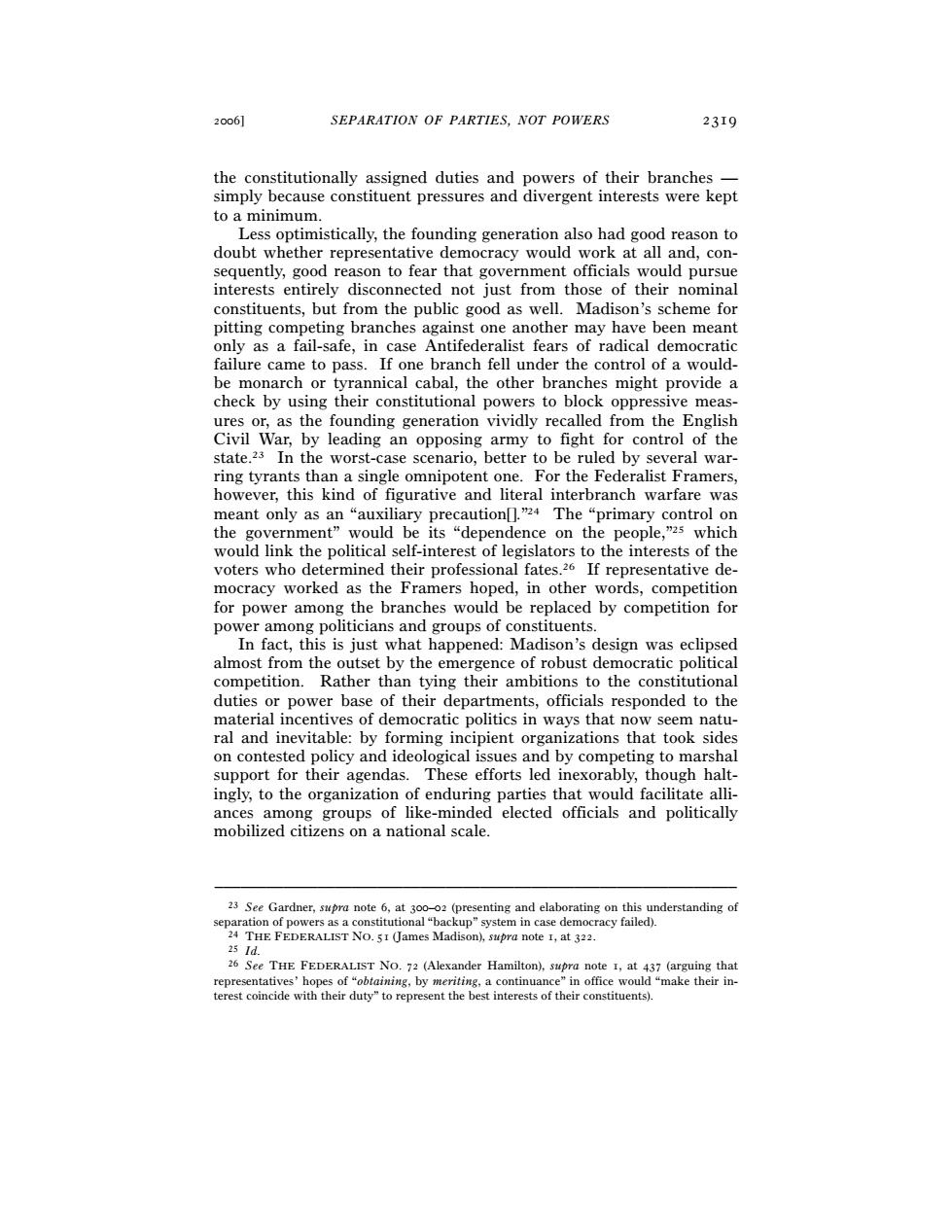正在加载图片...

2o06] SEPARATION OF PARTIES,NOT POWERS 23I9 the constitutionally assigned duties and powers of their branches- simply because constituent pressures and divergent interests were kept to a minimum. Less optimistically,the founding generation also had good reason to doubt whether representative democracy would work at all and,con- sequently,good reason to fear that government officials would pursue interests entirely disconnected not just from those of their nominal constituents,but from the public good as well.Madison's scheme for pitting competing branches against one another may have been meant only as a fail-safe,in case Antifederalist fears of radical democratic failure came to pass.If one branch fell under the control of a would- be monarch or tyrannical cabal,the other branches might provide a check by using their constitutional powers to block oppressive meas- ures or,as the founding generation vividly recalled from the English Civil War,by leading an opposing army to fight for control of the state.23 In the worst-case scenario,better to be ruled by several war- ring tyrants than a single omnipotent one.For the Federalist Framers, however,this kind of figurative and literal interbranch warfare was meant only as an "auxiliary precaution[."24 The "primary control on the government"would be its "dependence on the people,"25 which would link the political self-interest of legislators to the interests of the voters who determined their professional fates.26 If representative de- mocracy worked as the Framers hoped,in other words,competition for power among the branches would be replaced by competition for power among politicians and groups of constituents. In fact,this is just what happened:Madison's design was eclipsed almost from the outset by the emergence of robust democratic political competition.Rather than tying their ambitions to the constitutional duties or power base of their departments,officials responded to the material incentives of democratic politics in ways that now seem natu- ral and inevitable:by forming incipient organizations that took sides on contested policy and ideological issues and by competing to marshal support for their agendas.These efforts led inexorably,though halt- ingly,to the organization of enduring parties that would facilitate alli- ances among groups of like-minded elected officials and politically mobilized citizens on a national scale. 23 See Gardner,supra note 6,at 3002(presenting and elaborating on this understanding of separation of powers as a constitutional "backup"system in case democracy failed). 24 THE FEDERALIST NO.5I (James Madison),supra note I,at 322. 251d. 26 See THE FEDERALIST No.72 (Alexander Hamilton),supra note 1,at 437 (arguing that representatives'hopes of "obtaining,by meriting,a continuance"in office would "make their in- terest coincide with their duty"to represent the best interests of their constituents).2006] SEPARATION OF PARTIES, NOT POWERS 2319 the constitutionally assigned duties and powers of their branches — simply because constituent pressures and divergent interests were kept to a minimum. Less optimistically, the founding generation also had good reason to doubt whether representative democracy would work at all and, consequently, good reason to fear that government officials would pursue interests entirely disconnected not just from those of their nominal constituents, but from the public good as well. Madison’s scheme for pitting competing branches against one another may have been meant only as a fail-safe, in case Antifederalist fears of radical democratic failure came to pass. If one branch fell under the control of a wouldbe monarch or tyrannical cabal, the other branches might provide a check by using their constitutional powers to block oppressive measures or, as the founding generation vividly recalled from the English Civil War, by leading an opposing army to fight for control of the state.23 In the worst-case scenario, better to be ruled by several warring tyrants than a single omnipotent one. For the Federalist Framers, however, this kind of figurative and literal interbranch warfare was meant only as an “auxiliary precaution[].”24 The “primary control on the government” would be its “dependence on the people,”25 which would link the political self-interest of legislators to the interests of the voters who determined their professional fates.26 If representative democracy worked as the Framers hoped, in other words, competition for power among the branches would be replaced by competition for power among politicians and groups of constituents. In fact, this is just what happened: Madison’s design was eclipsed almost from the outset by the emergence of robust democratic political competition. Rather than tying their ambitions to the constitutional duties or power base of their departments, officials responded to the material incentives of democratic politics in ways that now seem natural and inevitable: by forming incipient organizations that took sides on contested policy and ideological issues and by competing to marshal support for their agendas. These efforts led inexorably, though haltingly, to the organization of enduring parties that would facilitate alliances among groups of like-minded elected officials and politically mobilized citizens on a national scale. ––––––––––––––––––––––––––––––––––––––––––––––––––––––––––––– 23 See Gardner, supra note 6, at 300–02 (presenting and elaborating on this understanding of separation of powers as a constitutional “backup” system in case democracy failed). 24 THE FEDERALIST NO. 51 (James Madison), supra note 1, at 322. 25 Id. 26 See THE FEDERALIST NO. 72 (Alexander Hamilton), supra note 1, at 437 (arguing that representatives’ hopes of “obtaining, by meriting, a continuance” in office would “make their interest coincide with their duty” to represent the best interests of their constituents)